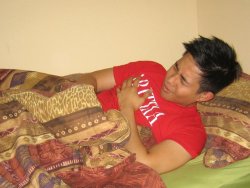
Costochondritis is a medical term that refers to a common condition in which joints of affected person become inflamed resulting into pain, tenderness and swelling over the ribs and cartilage around the breastbone. This inflammation usually grip several cartilage areas on both sides of the sternum but more often than not is on one side only.
Costochondritis Causes
The causes of Tietze’s syndrome are still unknown because it can be caused by several factors. However, costochondritis usually results from a physical strain or slight injury like recurring coughing, sneezing, vomiting, or impacts to the chest. It has also been realized that this condition occurs after hearty bouts of laughter. Costochondritis may occur as a result of over exerting and in some cases, the same may occur due to any injuries to the chest or breast. Psychological stress can aggravate this syndrome however, there is no evidence that has been brought forth to ascertain that it is a direct cause to this ailment.
Costochondritis Signs and Symptoms
The pain and tenderness suffered by a person affected with this syndrome happens either gradually or suddenly; and this is mainly manifested through a sharp pain in the upper ribs. Tenderness around the area of the upper ribs and swelling around the area of one’s upper ribs are also common signs and symptoms of this ailment. In addition to this, the pain could be made worse by sudden movements of the ribs at some point in physical activity or when one coughs or sneezes.
In most cases, the pain of Tietze’s syndrome is always confused with a case of heart attack. In contrast, the pain of heart attack is more widespread than that of Tietze’s syndrome which commonly affects a small area.
Costochondritis Treatment
Costochondritis is usually motivated by any activity that entails stressing the arrangements of the facade of the chest cage. It is thus prudent to minimize these activities until the tenderness of the rib and cartilage areas has subsided. Apply ice packs to the local swelling to reduce the pain and inflammation. If the tenderness persists, it is necessary to see a general practitioner for some anti-inflammatory drugs and injections. Consequently, the victim it is recommended that the patient should have enough rest. In addition to this, he or she ought to engage in consistent physical therapy until the pain subsides as these can lessen the impact of pain and inflammation, and thus promotes faster treatment to the patient.
Tietze’s syndrome is likely to improve on its own after a few weeks even though the affected person would still experience some swelling after the ache and tenderness have subsided. Any physical activity that is likely to worsen the pain in one’s chest should be avoided at all costs until and unless the inflammation in the ribs and cartilage has completely gone down. All these measures as explained above are aimed at effectively managing this condition. However, should the pain persist, it is advisable to seek medical treatment from a general practitioner.
I suffer from Costochondritis but have had it for about 18mths now, will it ever go? Or am I going to be one of those people who are in that 5% where it keeps reoccurring? ? I also have a Degenerative Disc Disease in L5-S1 (had 2x operation) and now its in the L3 + L4.